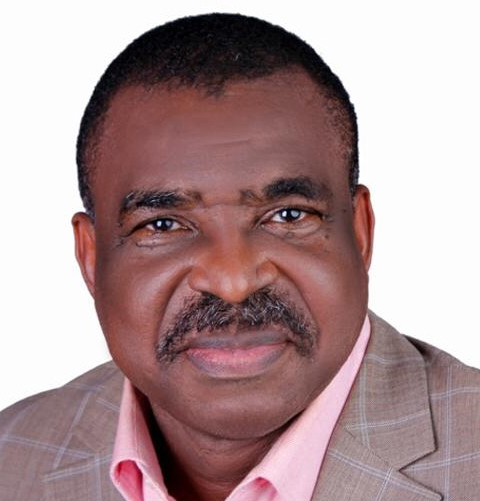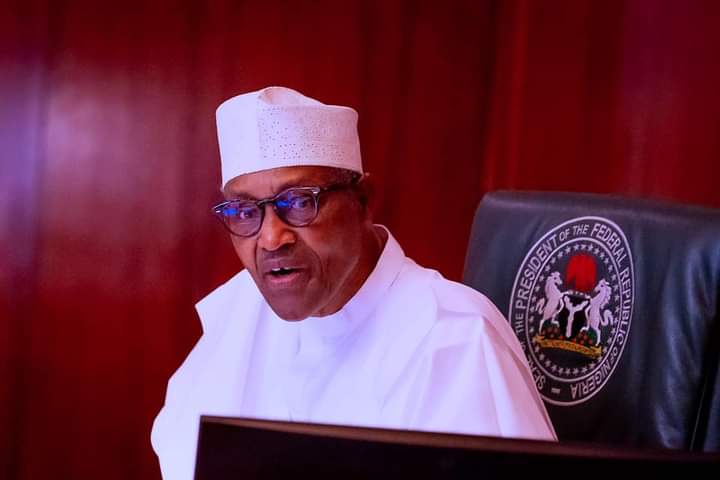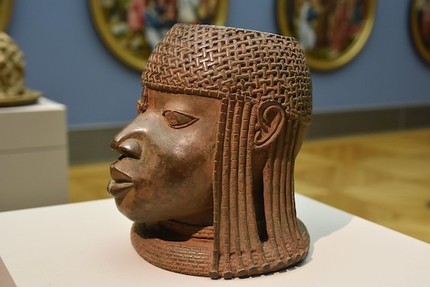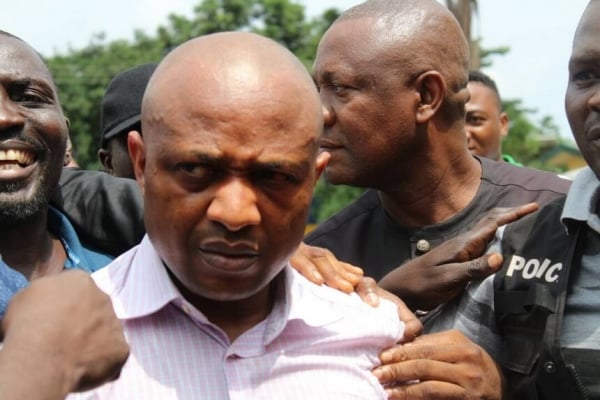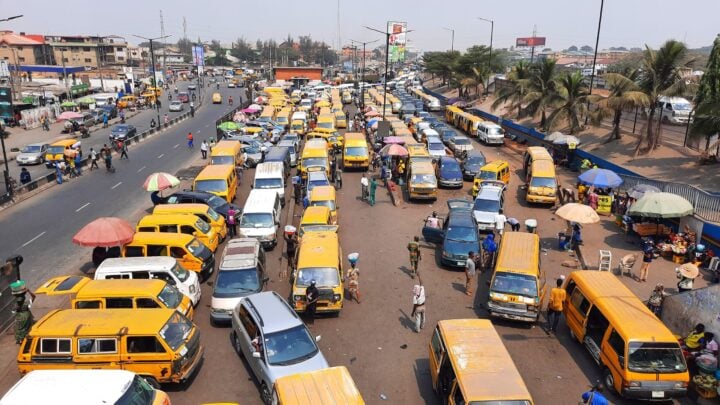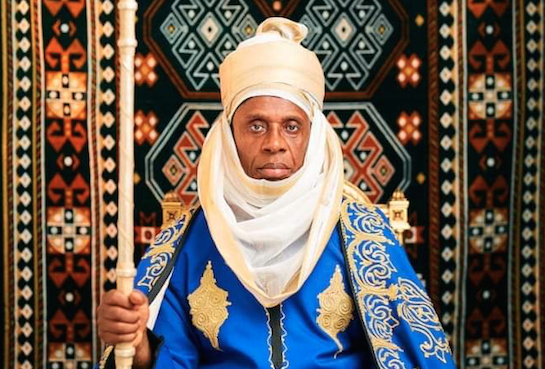Before going into the nitty-gritty of the implications of the continuous retention of fuel subsidy in our Nationa Budgets successively in the past four decades or so, and which by implication indicate that the welfare of Nigerians is in jeopardy as they would be enmeshed in a poverty trap for a long time, it is proper to explain the etymology of the phrase -kicking the can down the road which is the centerpiece of this article. The aim of this essay is to determine whether the decision to reverse the planned termination of fuel subsidy by the middle of this year and instead of retaining the debilitating petrol pump price subsidy for another 18 months is justifiably sustainable or injurious as it appears to be a manifest peril to the progress and prosperity of the good people of our potentially great country.
The Oxford dictionary defines the title of this intervention — kicking the can down the road — as putting off confronting a difficult issue or making an important decision, typically on a continuing basis.
According to Webster dictionary: “around the mid-1980s, a new phrase began to be heard in the U.S. Congress. To “kick the can down the road” became, in the rhetoric of some lawmakers, a colorful and mildly critical new way of referring to putting off work on an issue for a later date.”
And in the 1990s, it was George Bush, the 41st president of the United States of America, USA, that popularized the use of the colorful metaphor when he made the following statement :
Advertisement
“The average American knows what’s going on, I think. And I think they know that the Congress will continue to kick this can down the road and that they’ve got to act.”
By reversing itself in the decision to end petrol subsidy in the 2022 budget, current Nigerian leaders of the executive and legislative arms of government in the persons of President Muhammadu Buhari and senate president Ahmed Lawan seem to be ‘kicking the can down the road’ as president George Bush accused the Congress of the USA in the 1990s.
The fuel subsidy policy, of which our country has literarily been burning cash in excess of one trillion naira annually on the average in the past few decades, to most discerning Nigerians has become a sort of scourge and an albatross on successive administrations. Although it is a well-acknowledged fact that subsiding fuel pump price in Nigeria is not sustainable, no head of state or president since the era of Ibrahim Badamasi Babangida as military head of state in the 1980s, through the tenure of Sani Abacha and the presidency of Olusegun Obasanjo, Umar Musa Yar’adua to the incumbent, Buhari has had the ‘balls’ (pardon the porn) and leadership machismo or gumption to kill the vicious dragon gnawing at our dear country’s treasury via petrol subsidy.
Advertisement
Nigerian Economic Summit Group, NESG has put the frightening reality more starkly by stating in its latest Economic Outlook report that: petrol subsidy payments rose by 477% to N3.64 trillion in the past seven (7) years, which is between 2015 till date.
A breakdown of the figures by NESG reveals that the cost of petrol subsidy annually rose from N307 billion in 2015 to N1.77 trillion last year and for 2022, there is a provision of N3 trillion, which is almost a doubling of last years N1.77 trillion.
In light of the mind-boggling statistics about how the cost of petrol subsidy has skyrocketed such that it is draining our treasury, it is trite to state that it is the failure by our past and present leaders to act boldly by quickly decapitating the dragon of petrol subsidy-the no 1 financial capital draining policy in our country in the past four decades, that is responsible for the current snowball effect being experienced. Using NESG data, subsidizing petrol pump prices evolved from 2015 into a sort of malignant tumor that has become cancerous to the extent that it has currently metastasized into a debilitating and terminal disease afflicting our country.
With President Buhari capitulating to the fear of probable backlash of civil disturbance that petrol subsidy removal may cause (as orchestrated by organized labor leaders) and thus reversing the decision to pause his earlier decision to part ways with the anti-progress petrol subsidy regime; the incumbent president joins the infamous list of heads of government of Nigeria-military and democratic-that petrol subsidy has overwhelmed and demystified.
Advertisement
The irony of it all is that president Buhari was propelled into office in 2015 because it was felt that his track record as a no-nonsense and straight speaking former army general, he has the capacity and ability to make hard decisions to eliminate Boko Haram and drastically reduce insecurity, end the obnoxious fuel subsidy regime and improve on the political electoral system beyond the level that his predecessors Umaru Yar’adua and Goodluck Jonathan had taken reformation of Nigeria’s shambolic electoral system.
But alas, President Buhari has proven not to be the proverbial knight in shining armor by not stepping up to the plate to make the hard decisions. Instead, he demurred on the outlined three critically important policy planks that have the capacity to change the fortunes of our dear country from a basket case to a success story and offer the long-suffering masses a better future.
It is both gutting and sacrilegious that our country is not only borrowing to fund infrastructure as evidenced by the nation’s horrendous debt profile that has skyrocketed to almost $38 billion in 2021 from around $10 billion in 2015, before the advent of the incumbent government; it is also basically currently borrowing to pay the salaries of public servants as it runs a deficit budget whereby the revenue projected to be generated by government is far less than it’s proposed expenditure for the same period.
To put the scandalous financial situation in our country mildly, the inability to pay workers’ salaries without resorting to borrowing is not only highly embarrassing but also sacrilegious to men and women of goodwill. More so because when our political leaders have chosen to be literarily burning N3 trillion on fuel subsidy annually, the nation is going a-borrowing to pay public and civil servants salaries.
Advertisement
It is not only incomprehensible but also outrageous that a provision for fuel pump price subsidy in the national budget for 2022 for a whopping three (3) trillion naira, has been made.
Imagine the difference that investing N3 trillion in the current epileptic electricity power sector would make by enabling us to put behind our current circumstances of practically being our individual sources of electricity, to a situation whereby public supply is boosted in the nearest future via tapping of solar, wind and all the other renewable sources of energy.
Advertisement
The drastic and dramatic increase in the budgetary provision for fuel subsidy is according to Mrs. Zainab Ahmed, who is Nigeria’s minister of finance, borne out of the fact that the already highly distressed masses of Nigeria can no longer bear further hardships that would be triggered by fuel subsidy removal by mid-year as earlier proposed. Her alternative to providing N3 trillion in budget 2022 and eliminating petrol subsidy is the suggestion that government pays cash to the poorest Nigerians.
The payment to the poor could have amounted to cashing out about N2.4 trillion yearly. That is N600 billion less than the N3 trillion now allocated in this year’s appropriation document. The finance minister’s proposition is perhaps a better evil. But given what happened to trader Moni, and all the other Moni cash payment gambits used by the incumbent government to hoodwink the masses while bilking them, the finance minister was overruled. And she was literarily told to keep her bright idea to herself because it is susceptible to being hijacked by racketeers who are ever ready to take advantage of any government subsidy regime as is the case with the foreign exchange market managed by the CBN where the powerful in our society are feeding fat via arbitrage and round-tripping, no matter how the CBN governor tries to plug the loopholes.
Advertisement
So the jacking up of the appropriation for fuel subsidy that was in excess of N400 billion passed by the National Assembly, NASS to N3 trillion followed president Mohammadu Buhari’s change of mind from embarking on a phased removal of the obnoxious subsidy that could have been concluded in the second half of this year, (June 2022) but now extended to eighteen (18) months time.
It all started when senate president Ahmed Lawan perhaps persuaded by the case made by organized labor leaders that were threatening to go on strike should petrol subsidy be removed, visited the president in Aso Rock Villa shortly after the resumption of NASS from the end of year recess for consultations.
Advertisement
It would be recalled that the senate president later emerged from that meeting and announced to Nigerians that Buhari is not the author of the fuel subsidy removal earlier announced by finance minister Mrs. Ahmed, therefore he has no hands in it. But the truth is that the fuel subsidy regime is part of the conditions in the Petroleum Industry Act, PIA. And l suspect that it might have been part of the recommendations of the economic management team led by Doyin Salami, the economics egg head recently engaged by president Buhari as his chief economic adviser.
What the new position of the government on retention of petroleum pump price subsidy basically means is that until June 2023, that is one month after president Buhari must have left office on May 29, 2023, and which is effective in about seventeen (17) months time, the government will continue to subsidize fuel to the value of N270 billion monthly.
What is an escapist policy?
The beefed-up petrol subsidy in budget 2022 from about N400 billion to N3 trillion represents a significant percentage of the total national budget valued at the sum of =N=17,126,873,917,692 (Seventeen Trillion, One Hundred and Twenty-Six Billion, Eight Hundred and Seventy-Three Million, Nine Hundred and Seventeen Thousand, Six Hundred and Ninety-Two Naira) only, and which was passed by National Assembly, NASS, at end of last year.
In the light of the sextupling of the provision from roughly N400 billion to N3 trillion, many pressing questions are waiting to be answered.
And these are; would the approved budget be returned to NASS for a review or would the change be addressed via a supplementary budget or an amendment of PIA that mandates end of fuel subsidy, would be required?
As if trying to balance up the increase of budgetary provision for petrol subsidy in budget 2022 from about N400 billion to N3 trillion, an action apparently influenced by senate president Ahmed Lawan, who as stated earlier is driven by the fear of the possibility of labor and civil unrests, NASS has just given Ministries, Departments and Agencies, MDAs, a marching order to generate a minimum of three trillion naira in 2022.
The reason given by NASS for setting the high target is to generate more income in order to reduce the current massive borrowing by the federal government to fund its operations.
What the astronomical target of N3 trillion set for the money-generating organizations means is that the already highly burdened Nigerians would be further taxed more heavily in the year 2022 to buffet the highly unwieldy bureaucracy that needs to be streamlined, as opposed to being fed like an ogre with insatiable appetite into which it has degenerated.
And given the unpalatable experience that the nation has had with the electoral act amendment bill that has been in the pipeline since 2018 and which has been subjected to back and forth movements between NASS and Aso Rock Villa for a record five (5) times, some Nigerians are apprehensive of whether or not the 2022 budget is about to be mired in a quagmire similar to the fate that the electoral act amendment bill has been suffering.
Apart from the presidency and parliamentary afflictions that may befall the sudden and dramatic increase of the provision of more funds for fuel subsidy in the already passed and signed budget, there is another cause of concern. And it is the management of the treasury of our country.
The snag has to do with the veracity of the volume of petrol consumed by motorists and how much the authorities claim is being expended for that purpose monthly.
It may be recalled that the finance minister, Mrs. Ahmed had earlier claimed that our country was squandering N250 billion monthly on fuel subsidy. In her latest presentation to justify the new N3 Trillion provision, she increased the government’s monthly expenditure on fuel by N20 billion to N270 billion without justifying the sudden increase.
That there is a sudden swelling of the monthly fuel subsidy cost in the twinkling of an eye, is suspicious and worrisome.
Equally suspicious is the 66 million liters of fuel which the authorities claim is consumed daily in Nigeria by motorists. Back in 2012 consumption of premium motor spirit, PMS was estimated to be 42 million. That claim was even disputed by industry experts.
Apart from the belief by most Nigerians that at least a quarter of the 66 million is smuggled across the border into neighboring countries like Niger, Chad and Cameron, etc, another quarter of the 66 million liters per day is believed to be sexed up numbers by the bureaucracy.
The economic is allegedly being perpetrated in the NNPC, Federal ministry of finance, CBN, and Nigerian Customs Services whose officials are fleecing our beloved country through arbitrage and round-tripping via fictitious paperwork. It is earlier noted, it is rather unfortunate that petrol subsidy is being manipulated in the manner that foreign exchange allocation in the CBN is also being handled through racketeering. It is unsurprising that the current minister of state for petroleum resources, Timipre Sylva has also expressed reservations about the 66 million liters daily consumption of fuel being bandied around.
Considering that the confusion over the quantity consumed and allegations of falsification of the numbers has persisted over the past decades, why has an independent audit firm that is reputable, such as PriceWaterHouse, KPMG, Deloitte, etc not been appointed to conduct a forensic audit of the volume of petrol being claimed as being used by motorists on a daily basis?
How can a country that plans to spend in excess of N17 trillion in the year 2022, out of which the whole of N3.8 trillion will be applied in servicing debt, with the chunk of N3 trillion committed to funding petrol subsidy; a quantum of N6.9 trillion committed to recurrent expenditure and a measly N5.4 trillion reserved for capital projects, have a great future?
What the statistics above which is a recipe for a debt trap that precedes the poverty trap suggest, is that in our lifetime, our country may not get out of the poverty trap in which it is currently caught?
In other words, in the light of the outlined dire economic circumstances prevailing in our country, there is no chance that Nigeria would make progress such as the leaping from 3rd to the first world as Singapore did in a period of less than a decade?
In a recent study titled: Where is The Wealth of Nations? the World Bank tracked and published what it characterized as “Millennium Capital Assessment: monetary estimates of the range of assets-produced, natural, and intangible – upon which development depends.
According to the summary of one of the Bretton Woods Institutions reports “While important gaps remain, this comprehensive snapshot of wealth for 120 countries at the turn of the millennium aims to deepen our understanding of the linkages between development outcomes and the level and composition of wealth”
The Millennium Capital Assessment report of the World Bank caught my attention because it is relevant to our situation in Nigeria for multiple reasons. The chief reason is that it aims “to deepen our understanding of the linkages between development outcomes and the level and composition of wealth”.
Now, for long, I have had a strong conviction that the traditional measure of strengths and weakness of the economic capacity of nations such as Gross Domestic Products, GDP is an inadequate gauge.
And that is part of the focus of World Bank’s “Where Is The Wealth of Nations” study, with emphasis on Millennium Capital Assessment.
Here is how the authors of the study put it:
“The first key message is that natural capital is an important share of total wealth, greater than the share of produced capital. This suggests that managing natural resources must be a key part of development strategies. The composition of natural wealth in poor countries emphasizes the major role of agricultural land, but subsoil assets and timber and non-timber forest resources make up another quarter of total wealth. “It went further to state that “The total share of natural resources in total wealth and composition of these resources make a strong argument for the role of environmental resources in reducing poverty, fighting hunger, and lowering child mortality.”
Since Nigeria is a third-world/developing economy that relies heavily on natural resources in the topsoil (farming and forest resources) subsoil, (oil/gas, gold other solid minerals) for sustenance, I was captivated by the outcome of a unique and groundbreaking study.
I became keen on finding out whether or not changes in wealth matter for the generation of well-being(one of the goals of the study) against the backdrop of the fact that the intangible wealth/capital in Nigeria that revolves around the value in agriculture from top of the soil such as rice farming and wealth from the sub soil such as oil/gas, gold and other solid mineral resources obtained through the process of extraction, is our source of sustenance.
The study is poignant since reports by financial experts indicate that our beloved nation spends one-third of its annual budget servicing debts and at the same time faces the reality of being about to literarily set N3 trillion on fire in the guise of subsidizing fuel in the interest of the poor masses. The matter is made worse by the fact that our country’s revenue from the aforementioned resources (intangible wealth/capital) is far below what we plan to spend as outlined in our national budget. In simple terms, our beloved country is highly leveraged by debt as we are like a drunken sailor spending more than we earn and therefore susceptible to shocks despite the vast amount of intangible wealth, particularly crude oil that is our main foreign exchange earner.
Apart from the challenge of petrol subsidy, another potential catastrophe that has been allowed to fester and therefore lurking and likely to take its toll on our country’s ability to generate revenue is the huge losses of crude oil to thieves. It is a serious act of criminality being recorded in the oil and gas sector. That is what recently piqued Tony Elumelu, chairman of HEIRS Holdings, and prompted him into raising an alarm about the fact that Nigeria is losing about $4 billion annually to crude oil theft. When the fact that one-third of our nation’s budget is geared towards debt servicing (N3.8 trillion) and another quarter (N3 trillion is committed to funding subsidy) turning a blind eye to the loss of about $4 billion to oil crude oil thieves, are red flags inviting our attention to the fact that our economy would collapse sooner than later if measures are not taken to address the prevailing malaise of imprudent management of our abundant intangible resources.
During the run-up to the election of then President Umaru Musa Yar’adua to replace then President Olusegun Obasanjo in 2007, I had the privilege of packaging the 7 point agenda for the presidential campaign of then-candidate, Umaru Musa Yar’adua of blessed memory.
And unleashing the value of land in the hinterland (intangible wealth) which has been dead capital because of land use decree imposed by then army general, Olusegun Obasanjo, OBJ when he was military head of state was one of the priorities captured in the 7 point agenda. Unfortunately, Yar’adua passed away barely two years into his first term as president. So the agenda was never pursued further
, especially as it pertains to repealing and replacing the atrocious land use decree which was introduced implicitly to take control of the mineral resources endemic in the Niger Delta by the federal government; and explicitly in pursuance of the mission of federal might by OBJ as military head of state.
Can you imagine how rich folks in the hinterland with vast lands (currently without significant market value) would be if the land use decree is repealed today and such land can serve as collateral for them to obtain loans from banks to produce wealth?
I can bet that such a policy reversal would skyrocket the GDP of our country overnight from the current $430 million to at least $1.1 billion like that of Indonesia.
But our leaders in Aso Rock Villa and NASS are too blindsided to identify such opportunities that would enhance the growth potentials of our country. Rather they prefer to sustain their emasculation of the masses by plucking the low-hanging fruits via setting high revenue generation targets for agencies like Nigerian Customs Service, Federal Inland Revenue Service etc. All in the bid to sustain the extravaganza into which government has degenerated such that instead of serving the people, our leaders in government are prioritizing and pursuing personal aggrandizement agenda.
It is quite stunning to me that practically every anomaly that the incumbent government promised Nigerians that it has come to correct has become more entrenched and even intractable. Take fuel subsidy for instance. President Buhari as a retired army general between 1995-98 served as chairman of Petroleum Trust Fund, PTF which is a social intervention agency set up by the late head of state army general Sani Abacha to ameliorate the pains of petrol subsidy withdrawal which his government implemented.
Why is it that, unlike his predecessors who were compelled to introduce social safety measures to serve as a buffer when petrol subsidy is removed, there has been no significant policy introduced to kill the monster of fuel subsidy and give Nigerians some succor in the past six (6) years of president Buhari’s reign? Instead, the pump price of petrol has climbed from N87 per liter in 2015 to N162 today. And naira /dollar exchanged rate has spiraled from less than N200 before the APC ascension to power at the center nearly 7 years ago to the current outrageous parallel market rate hovering around N600 to $1.
Could it simply be drilled down to the current ruling party at the center, APC being unprepared to lead even though president Buhari had been in the contest to lead Nigeria four times beginning from 2003 until he clinched it in 2015?
At the nascent stages of this administration, some of us shouted ourselves hoarse while trying to draw the attention of the incumbent government to the fact that it was foolhardy setting up the Itse Sagay led the anti-corruption committee which indicated that the war against corruption was the priority of the government. We tried to counsel that it is a crass strategy to prioritize establishing an anti-corruption committee over and above setting up an economic advisory team which could have steered the nation away from the two economic recessions which it descended into successively in a period of fewer than five years. Today, apart from 10.5 million children being out of school,(according to UNICEF report) of which about half of them would be recruited into criminality such as religious insurgents and bandits, a recent corruption index rating by the global anti-corruption agency, Transparency International, TI ranks Nigeria as no 154 of the l80 most corrupt countries in the world.
Nigeria scored only 26 of the 100 points in the matrix to be adjudged to be a corruption-free, or corruption-afflicted country.
It is gutting that our country has dropped in the TI rating consistently in the past three years from 24 points to 25 and the current 26 points.
So, by and large, the perception of our beloved country by outsiders has become worse than president Buhari met it in 2015. It is needless emphasizing that negative corruption perception impedes Foreign Direct Investment, FDI into our country. And attracting foreign investment via the creation of enabling environment which reduces the risk of doing business is a cardinal quest of any country.
With the 2023 general elections on the horizon, pundits are predicting a further flight of Foreign investment out of our country.
As if the administration saved the best for last (a tactic that is only ideal in the entertainment industry) by appointing professor Doyin Salami as economic adviser and chairman of the economic council at a time that it is at the expiry stage of its constitutionally allowed two terms tenure. This means that Buhari’s regime has a shelf life of barely 17 months.
l am reminded of the instructive and inspiring case study about an owner of a law firm.
The lawyer detested advertising so much so that he swore never to use the services of advertising firms to market his services.
Over the years, his law firm became insolvent owing to lack of visibility and he had no better option than to sell it.
After failing to sell it without help, he enlisted the services of an advertising firm to solicit for a buyer of his law firm that had become unviable due to his irredeemable disdain for advertising.
That is what appears to be the case in Nigeria where authorities failed at inception to appoint a world-class economic team to help salvage our economy that was in dire straights. Instead, it prioritized the anti-corruption agenda by setting up PACAC – a bunch of bellyaching and hell-raising eggheads that have engaged more in activism for self-aggrandizement than playing the role of policy wonks that they are supposed to be doing. And in the process, they have unwittingly chased away investors-both local and foreign.
Ultimately, the de-marketing of Nigeria orchestrated by members of the Itsey Sagay committee against corruption and the minister of information, Lai Mohammed that appeared to have been competing with each on who would label our country with the worst toga of corruption in order to ‘earn’ the commendation of President Buhari that is believed to have zero tolerance for corruption, obliterated whatever good that was left in the image of our dear country.
I am convinced that it is such unwarranted self-immolation (by shouting on the rooftop that Nigerians are fantastically corrupt) aimed at salvaging the previous administration in the eyes of the world that practically led our country into economic doldrums — two successive recessions as investors quickly took a flight out of our country.
As the saying goes, a comet does not strike twice in a lifetime. But in defiance of that aphorism, our country’s economy went into recession twice, which is unprecedented in the annals of our nation.
It is in the light of the conventional wisdom: it is better late than never, that it is hoped that even in the eleventh hour, Doyin Salami and his economic team would help president Buhari leave a more savory legacy by assisting him to salvage what is left of a sordid odyssey so that the image and reputation of this government would be better than what it is rapidly crystalizing into.
I am of the conviction that over the past decades that the reform of the oil/gas sector was put on the drawing board, nothing much has really changed in government policy about petrol subsidy. That is despite the plan to end petrol subsidy whose execution was commenced through the provision of a little more than N400 billion in 2022 fiscal appropriation.
Killing the dragon of petrol subsidy is in consonance with the provisions of the Petroleum Industry Act, PIA, a policy that had been in the pipeline for several decades and of which president Buhari broke the jinx by signing the bill into an act of law.
It is rather astonishing that the gains made with the introduction of PIA got reversed following the reintroduction of petrol subsidy into the 2022 budget after it had been passed by NASS and approved by President Buhari. It is most likely that the provision of N3 trillion to fund petrol subsidy and which is the subject of this intervention, is also a policy supported by the economic adviser to the president, Doyin Salami, and his economic management team.
If the advice of his economic management team has been ignored, it elicits the question: is the engagement of the economic council led by Salami just cosmetic?
It is worth noting that President Buhari was elected by Nigerians in 2015 to basically end religious Insurgency by those now tagged bandits wreaking havoc on society, kill corruption which is responsible for the underdevelopment of society and improve on governance system by strengthening internal democracy in the political parties to boost the process of recruiting our political leaders and most importantly, alleviate poverty especially for the masses who constitute the bulk of his supporters.
It is highly disappointing that the aforementioned goals in the mission of Buhari have been achieved in breach.
The non-achievement of his lofty objectives is presumably owed to mr president being susceptible to being swayed by people around him who basically have agendas that are hardly altruistic.
The truth is that, like most Nigerians, some of us in the commentariat had thought that as an ex-army general, President Buhari would stand his ground against forces around him that are creating fear and panic that the heavens would literarily fall if certain policies such as direct primaries and removal of petrol subsidy and resort to the use of soldiers of fortunes (hired foreign mercenaries) to flush out terrorists are implemented. Those who have held the president captive, are doing so in order to discourage him from implementing some policy actions to which he is often initially favorably disposed of until naysayers cause him to demur from implementing such policies that could have enabled him to leave a positive legacy that is worthy of emulation.
Take for instance, the Electoral Act Amendment bill 2018 which is still in the pipeline up to date. A heavy siege was laid on President Buhari not to assent to the bill as passed by NASS for an extraordinary five (5) times even though the amendment has the capacity to improve our country’s electoral system and boost democracy in our beleaguered nation. It is not a thing to be proud of that it took the visits of NASS and governors forum leadership to Aso Rock Villa to persuade president Buhari to veto the bill after the one month mandatory period before NASS would override him if he fails to sign the bill into an act,
Although the bill has some toxic content, as the saying goes, a problem identified is a problem 50% solved.
Having identified the potential sinister motive inherent in the adoption of direct primaries as the sole process for the election of party candidates, it could have been ring-fenced to prevent the implementation of the negative intentions contained therein.
Instead, the bill was vetoed and our country once again ended up throwing away the baby and the bathwater as a policy that has the capacity to strengthen our democracy was sacrificed on the altar of fear. Similarly, removing petrol subsidy which has evolved into a sort of vicious beast devouring our country’s treasury was deemed as fait accompli when the 2022 budget was passed with the plan to completely eliminate subsidy on the pump price of petrol by the middle of the year.
But after another visit to Aso Rock Villa by the usual suspects-the leadership of the senate and governors forum, the finance minister Zainab Ahmed and perhaps Doyin Salami led economic council was literarily thrown under the bus by President Buhari when he reversed the policy by increasing provision for petrol subsidy which is basically subsidizing consumption instead of production (which could have been the ideal economic policy) from N400 billion to N3 trillion.
Shockingly, Buhari also postponed the removal of petrol subsidy by 18 months when he would be leaving office in 17 months’ time.
By so doing, the evil or day of reckoning has been effectively postponed and president Buhari would have left office as president before the petrol subsidy is removed.
Where does such an escapist policy situate president Buhari morally and in leadership?
Certainly not in a good place. If President Buhari had the patriotic confidence to close our borders to stem the flow of imported rice to protect local rice farming which manifested in the rice pyramids recently showcased in Abuja, why can’t he close the border against smugglers of subsidized petrol out of Nigeria into neighboring countries so that we can determine the volume we consume locally, make realistic budgetary provision and consider encouraging our petrol retail service providers to extend their services to our neighbors when Dangote refinery comes on a stream alongside the numerous potential modular refineries already awarded licenses but which can’t commence a business due to the subsidy regime that distorts realistic market pricing of the commodity?
Would the seeming failure to rise up to the occasion by not acting decisively with respect to the electoral process reforms and removal of petrol subsidy, not vitiate the gains already recorded in ramping up farming, particularly rice production, and positive outcomes in other areas such as railways development under his watch?
That brings me to the conclusion reached by the authors of the world bank: Where Is The Wealth of Nations? the study which bears striking resemblance to the current reality in our beloved Nigeria.
In the session titled: “Putting It All Together”, the authors of the study made the following case:
“It is in developing countries where accounting based on comprehensive wealth and its changes is most likely to be a useful indicator to guide policy.
They wrote that:
“The evidence suggests that involvements in produced capital, human capital, and governance, combined with saving efforts aimed at offsetting the depletion of natural resources, can lead to future welfare increases in developing countries.”
And argued further that: “The step from saving to investment is crucially important. If investments are not profitable, the effect on wealth is equivalent to consumption, but without the boost to well-being presumed to accompany consumption.”
Is the scenario painted above not the sorry state that our beloved country is languishing in right now? Would paying attention to the wise counsel of the world bank not be a reasonable idea for our leaders? Primordial sentiments and pursuit of the primitive acquisition of wealth facilitated by weak regulatory institutions would deter our leaders from adopting such positive values contained in the study by the technocrats from the global financial institution.
The authors of the world bank study did not just shed light on the hitherto hidden values in developing economies such as intangible wealth, but it emphasized the following paradigm that must exist for the identified benefits to be harnessable:
“Achieving the transition from natural-resource dependence (apparently the case in Nigeria) to sustained balanced growth requires a set of institutions that are capable of managing the natural resource, collecting rents, and directing these rents into profitable investments. Are these not the institutions that are manifestly lacking in our country?
Finally, the authors of the study concluded by stating unequivocally that the below listed institutional framework must be in place for the transformation of one form of wealth, let’s say oil/gas in the soil into other forms of wealth such as the acquisition of infrastructures like railroads, buildings, machines, and human capital, etc to manifest. These are: “Resource policy, fiscal policy, and political economy all have a role to play in this transformation.”
I believe that is one of the cardinal objectives of the Petroleum Industry Act, PIA which although has since been passed into law by NASS, with president Buhari signing off on it hence it is now a law guiding the oil/ gas industry, the current authorities, (like their predecessors) lack the courage to implement the PIA to its full letter and spirit.
I recognize the power of organized labor and the challenge that government faces if the labor leaders are not carried along. But l equally believe in the efficacy of negotiations in resolving thorny and complex issues such as the removal of fuel subsidy.
It is on record that labor leaders have been insisting on retaining the oil subsidy regime since the tenure of military president Ibrahim Badamasi Babangida when the Directorate of Rural Roads and Infrastructure was established following oil subsidy reduction; to Sani Abacha’s regime when a similar agency, PTF earlier referenced was also set up with funds accruing from Petrol subsidy reduction.
The labor leaders ought to have been reminded that the government has been dancing to their tune by not removing the subsidy over the past three or four decades, yet the welfare of Nigerian workers and citizens have gone from bad to worse mainly due to the fact that oil subsidy now ratcheting up to N3 trillion annually has been depleting Nigeria’s treasury. That is simply because the revenue which is supposed to be invested into production is being used up in funding dubious fuel subsidy which is a consumption activity recognized by economists as being wasteful.
Since only a mad man does something the same way continuously and expects a different result, organized labor should have been told that government is not mad, and it is therefore certain that retaining petrol subsidy would result in the same result as the previous outcomes. So petrol subsidy must go.
Otherwise, organized labor should therefore kindly come up with alternative plans such as either agreeing to retrenchment of workers to reduce massive overhead costs(recurrent expenditure in the budget N6.9 trillion) or accepting petrol subsidy removal and saving N3 trillion.
As President Buhari pointed out in his letter to NASS that democracy is about the exercise of options, hence he vetoed the electoral act amendment bill featuring direct primaries as the sole process for political parties to bring up candidates for public office elections, the organized labor should have been offered the aforementioned two options. Better still Nigerians should have been given the opportunity to have a referendum on the matter as IBB did back in the days with Structural Adjustment Program, SAP.
Again, when all the facts are laid bare, I can wager a bet that Nigerians would have voted for fuel subsidy removal just as they would have also voted for direct primaries to be retained in the amended Electoral bill awaiting presidential assent.
President Buhari was in a pole position to make the hard but potentially life-changing decisions on the three issues of electoral reform, petrol subsidy removal, and ending insecurity of lives and property by tackling Boko Haram head-on at the inception of his regime and taking the road less traveled on the other matters.
Particularly because he is serving his last term in office as president, so he has nothing to fear by trading the potential loss of cheap popularity for a long term gain of being the patriotic leader who saved Nigeria from self-destructing via a terminal debt trap that like a boa constrictor serpent is squeezing the life out of our dear country via the retention of petrol subsidy in budget 2022.
Magnus Onyinbe, an entrepreneur, public policy analyst, author, development strategist, alumnus of Fletcher School of Law and Diplomacy, Tufts University, Massachusetts, USA and a former commissioner in Delta state government, sent this piece from Lagos
Add a comment
